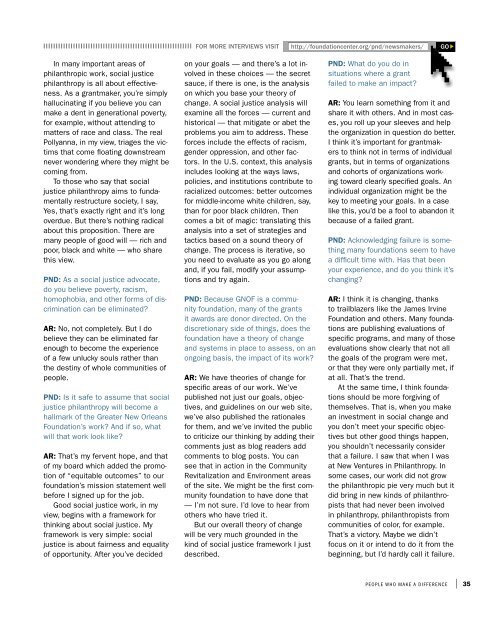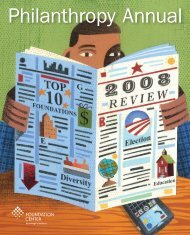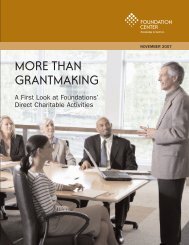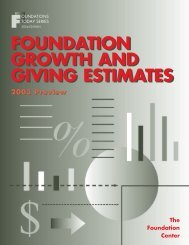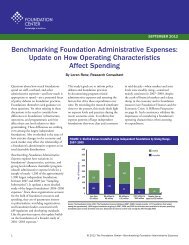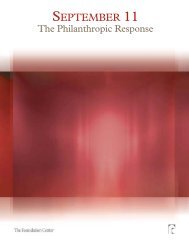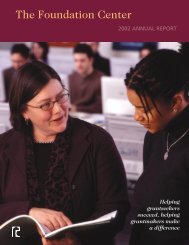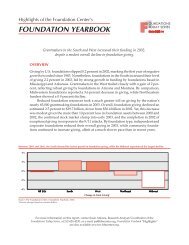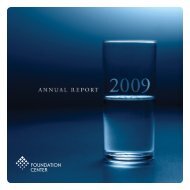Download Philanthropy Annual PDF - Foundation Center
Download Philanthropy Annual PDF - Foundation Center
Download Philanthropy Annual PDF - Foundation Center
You also want an ePaper? Increase the reach of your titles
YUMPU automatically turns print PDFs into web optimized ePapers that Google loves.
For more interviews visit<br />
http://foundationcenter.org/pnd/newsmakers/<br />
GO<br />
In many important areas of<br />
philanthropic work, social justice<br />
philanthropy is all about effectiveness.<br />
As a grantmaker, you’re simply<br />
hallucinating if you believe you can<br />
make a dent in generational poverty,<br />
for example, without attending to<br />
matters of race and class. The real<br />
Pollyanna, in my view, triages the victims<br />
that come floating downstream<br />
never wondering where they might be<br />
coming from.<br />
To those who say that social<br />
justice philanthropy aims to fundamentally<br />
restructure society, I say,<br />
Yes, that’s exactly right and it’s long<br />
overdue. But there’s nothing radical<br />
about this proposition. There are<br />
many people of good will — rich and<br />
poor, black and white — who share<br />
this view.<br />
PND: As a social justice advocate,<br />
do you believe poverty, racism,<br />
homophobia, and other forms of discrimination<br />
can be eliminated?<br />
AR: No, not completely. But I do<br />
believe they can be eliminated far<br />
enough to become the experience<br />
of a few unlucky souls rather than<br />
the destiny of whole communities of<br />
people.<br />
PND: Is it safe to assume that social<br />
justice philanthropy will become a<br />
hallmark of the Greater New Orleans<br />
<strong>Foundation</strong>’s work? And if so, what<br />
will that work look like?<br />
AR: That’s my fervent hope, and that<br />
of my board which added the promotion<br />
of “equitable outcomes” to our<br />
foundation’s mission statement well<br />
before I signed up for the job.<br />
Good social justice work, in my<br />
view, begins with a framework for<br />
thinking about social justice. My<br />
framework is very simple: social<br />
justice is about fairness and equality<br />
of opportunity. After you’ve decided<br />
on your goals — and there’s a lot involved<br />
in these choices — the secret<br />
sauce, if there is one, is the analysis<br />
on which you base your theory of<br />
change. A social justice analysis will<br />
examine all the forces — current and<br />
historical — that mitigate or abet the<br />
problems you aim to address. These<br />
forces include the effects of racism,<br />
gender oppression, and other factors.<br />
In the U.S. context, this analysis<br />
includes looking at the ways laws,<br />
policies, and institutions contribute to<br />
racialized outcomes: better outcomes<br />
for middle-income white children, say,<br />
than for poor black children. Then<br />
comes a bit of magic: translating this<br />
analysis into a set of strategies and<br />
tactics based on a sound theory of<br />
change. The process is iterative, so<br />
you need to evaluate as you go along<br />
and, if you fail, modify your assumptions<br />
and try again.<br />
PND: Because GNOF is a community<br />
foundation, many of the grants<br />
it awards are donor directed. On the<br />
discretionary side of things, does the<br />
foundation have a theory of change<br />
and systems in place to assess, on an<br />
ongoing basis, the impact of its work?<br />
AR: We have theories of change for<br />
specific areas of our work. We’ve<br />
published not just our goals, objectives,<br />
and guidelines on our web site,<br />
we’ve also published the rationales<br />
for them, and we’ve invited the public<br />
to criticize our thinking by adding their<br />
comments just as blog readers add<br />
comments to blog posts. You can<br />
see that in action in the Community<br />
Revitalization and Environment areas<br />
of the site. We might be the first community<br />
foundation to have done that<br />
— I’m not sure. I’d love to hear from<br />
others who have tried it.<br />
But our overall theory of change<br />
will be very much grounded in the<br />
kind of social justice framework I just<br />
described.<br />
PND: What do you do in<br />
situations where a grant<br />
failed to make an impact?<br />
AR: You learn something from it and<br />
share it with others. And in most cases,<br />
you roll up your sleeves and help<br />
the organization in question do better.<br />
I think it’s important for grantmakers<br />
to think not in terms of individual<br />
grants, but in terms of organizations<br />
and cohorts of organizations working<br />
toward clearly specified goals. An<br />
individual organization might be the<br />
key to meeting your goals. In a case<br />
like this, you’d be a fool to abandon it<br />
because of a failed grant.<br />
PND: Acknowledging failure is something<br />
many foundations seem to have<br />
a difficult time with. Has that been<br />
your experience, and do you think it’s<br />
changing?<br />
AR: I think it is changing, thanks<br />
to trailblazers like the James Irvine<br />
<strong>Foundation</strong> and others. Many foundations<br />
are publishing evaluations of<br />
specific programs, and many of those<br />
evaluations show clearly that not all<br />
the goals of the program were met,<br />
or that they were only partially met, if<br />
at all. That’s the trend.<br />
At the same time, I think foundations<br />
should be more forgiving of<br />
themselves. That is, when you make<br />
an investment in social change and<br />
you don’t meet your specific objectives<br />
but other good things happen,<br />
you shouldn’t necessarily consider<br />
that a failure. I saw that when I was<br />
at New Ventures in <strong>Philanthropy</strong>. In<br />
some cases, our work did not grow<br />
the philanthropic pie very much but it<br />
did bring in new kinds of philanthropists<br />
that had never been involved<br />
in philanthropy, philanthropists from<br />
communities of color, for example.<br />
That’s a victory. Maybe we didn’t<br />
focus on it or intend to do it from the<br />
beginning, but I’d hardly call it failure.<br />
People Who Make a Difference | 35


